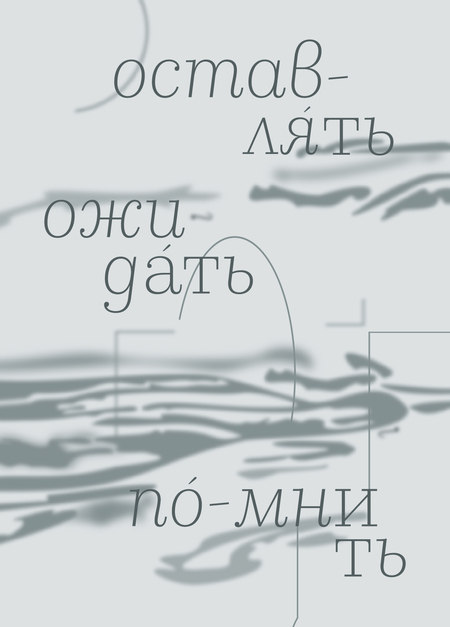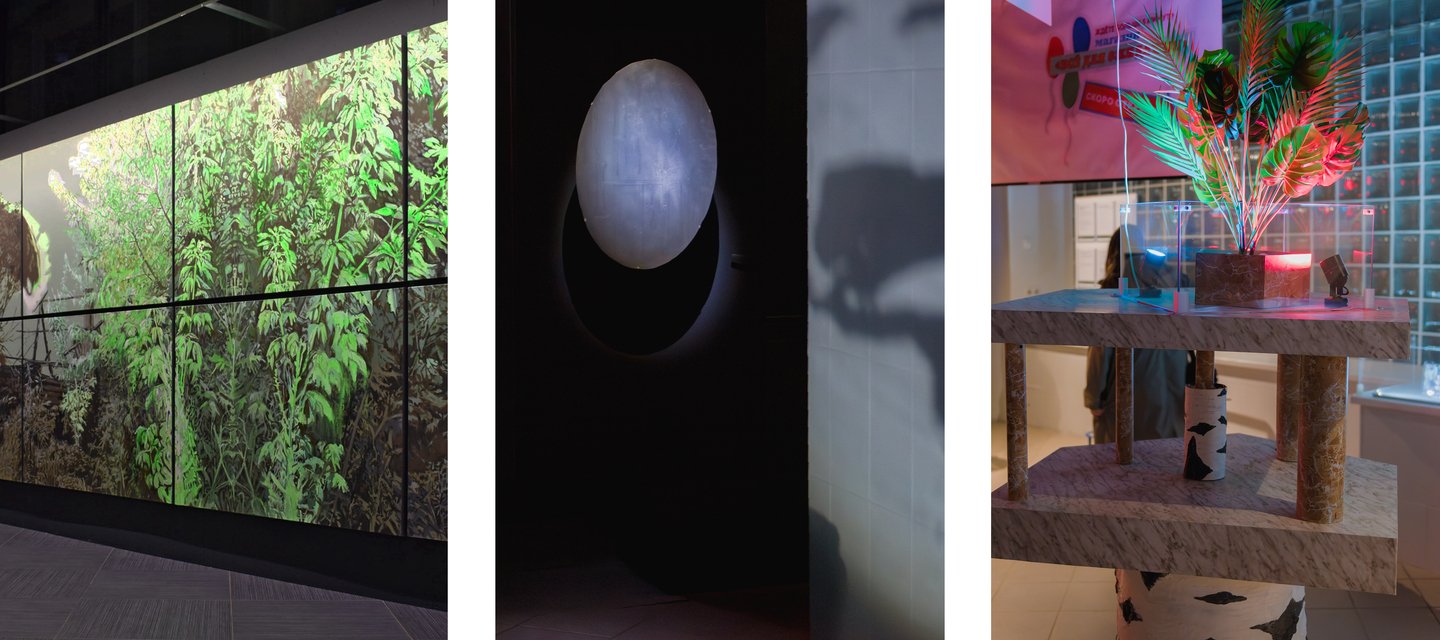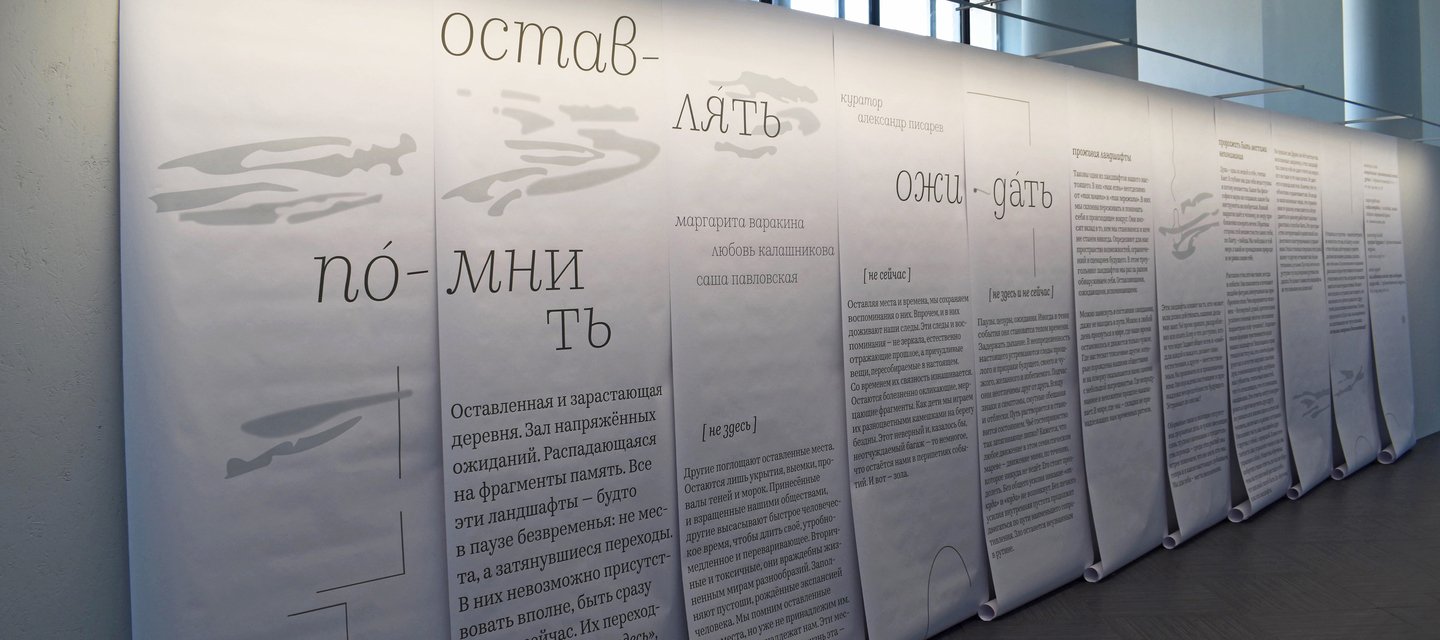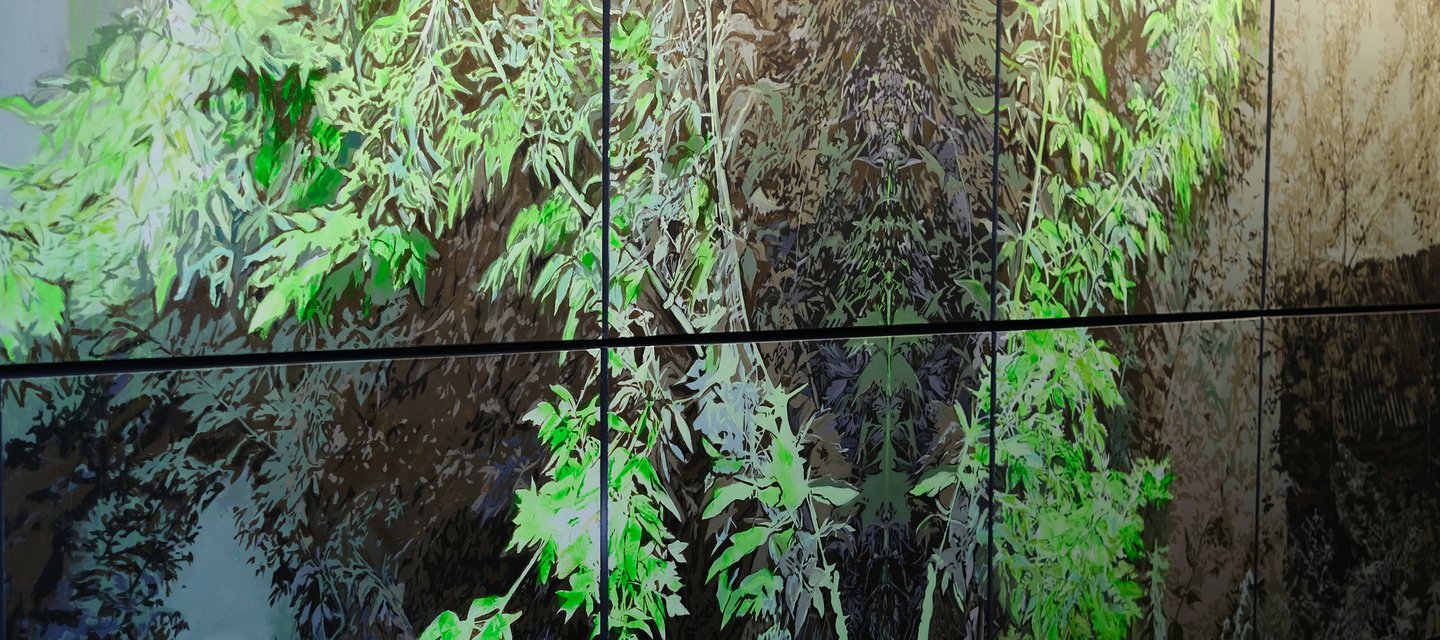
Leave, wait, remember
02.06 — 18.06.23 ZIL Cultural Centre Artists Margarita Varakina Love Kalashnikov Sasha Pavlovska curator Alexander Pisarev

Photo by Ruslan Hafizov
The love of Kalashnikov others. blubber . Sasha Pavlovsky’s painting installation on the surface. Aluminium, old bases for Margarit Varakin’s mirrors Expectation room. Total installation

Left behind and growing village. It’s a place of intense expectations. Fragmented memory. All of these landscapes are like, uh, 'nbsp'; 'mdash', like, in 'nbsp', a lot of time off: not 'nbsp; places, but 'nbsp; long transitions. It’s impossible for them to be present, to be here right now, and now. Their transition beats that « here» then « now» by making stay not equal to yourself, but whatever « owns» — impossible.

The love of Kalashnikov. «Others. „Cleaning“
[Not here] Others absorb the leftovers. All that’s left is shelter, excruciation, shadow failure, and faint. Presented and bred by our societies, others suck out fast human time to last their own, uterus-slow, and digesting. Secondary and toxic, they’re hostile to different life worlds. The deserts born of man’s expansion are filled. We remember the seats we left behind, but they’re not ours anymore. They’re not ours either. These places live their lives, and life this — after us and without us.
Sasha Pavlovska. «On the surface»
[n now] Leaving places and time, we save memories of they. However, and in they survive our tracks. These footprints and memories — not lookers, naturally reflecting the past, a bizarre things gathered in real. C time for them communication wears out. There are still painfully shiny, shiny fragments. As children, we’re playing them with different coloured stones on the 'nbsp; I’m saving the abyss. This infidel and it seemed like that undisposed baggage — that a little bit that remains us in the a routine of events. And there’s an ass.
Marguerite Varakin. «Expectation»
[Not here and not now] Pauses, caesures, expectations. Sometimes in 'nbsp; the shadows of events they become the body of time. Hold your breath. B the uncertainties of the present are the traces of the past and the ghosts of the future, of their own and of the outside, of the desirable and of the avoided. Sometimes they’re indistinguishable from each other. Everywhere are signs and simptoms, vague promises and glitter. The path disappears and becomes state. Whose hospitality is so tediously sticky? It seems that any movement in the this seven-year-old mare — traffic by, by, by, by, by, by, by, by, by, by, by, by, by, by, by, by, by, by, by, by, by, by, by, by, by, by, by, by, by, by, by, by, by, by, by, by, by, by, by, by, by, by, by, by, by, by, by, by, by, by, by, by, by, by, by, by, by, by, by, by, by, by, by, by, by, by, by, by, by, by, by, by, by, by, by, by the way, by, by, by, by, by, by, by, by, by, by, by, by, by, by, by, by, by, by, by, by, by, by, by, by, by, by, by, by, by, by, by, by, by, by, by, by, by, by, by, by, by, by, by, by, by, by, by, by, by, by, by, by, by, by, by, by, by, by, by, by, by, by, by, by, by, by, by, by, by, by, by, by, by, by, by, by, by, by, by, by, by, by, by, by, by, by, by, by, by, by, by, by, by, by, by, by, by, by, by, by, by, by, by, by, by, by, by, by, by, by, by, by, by, by, by, by, by, by, by, by, by, by, by, by, by, by, by, by, by, by, by, by, by, by, by, by, by, by, by, by, by, by, by, by, by, by, by, by, by, by, by, by, by, by, by, by, by, by, by, by, by, by, by It’s worth overcoming. Without a common effort, no ' lao; from where ' raquo; and & laquao; where ' raquo; not will be reached. Without personal effort, the inner void will continue to move along the path of the least resistance. Evil will remain undetected in rutin.
Living the 'nbsp; landschafts
The love of Kalashnikov. «Others. „Cleaning“
These are one of the landschafts of our present. In these ' lao; so there is» is inseparable from « so understood» and « so it has survived». In they are we tend to worry and understand ourselves and happen around. They’re contributing to what we’re gonna be and who we’re never gonna be. They provide us with space of opportunity, constraints, and scenarios of the future. In this triangle of landscapes we once after once we discover ourselves. Abandoning, waiting, remembering. You can hang out in waiting conditions, not even being in put. You can wake up every day in a world where our time has stopped and the only move is someone else’s. Where we are drawn together by the toxic others that are created by our societies, and a the truth is that we are ourselves with a small error. Where the thoughtless and the unbsp; the undead past punishes. In 'nbsp; the world where we are 'nbsp; '— the folding not 'nbsp; the time rhythms that belong to us.
Sasha Pavlovska. «On the surface»
These landscapes affect the who can or should act, what things are being done. Whose time has come, broken or taken away. Who and what is available, who and whobsp; what they see. They ask everyone in common and & laquao; their own& raquao; for each and for each and every one they make one natural, and another — unnatural. We 'nbsp; we live them 'nbsp; and 'nbsp; we live them. They are born of the present and they belong to the uncertainty of the future. Are they setting us up? Interrupted connections and irritating absences, interrupted cases, and foreign words, difficult undertakings, and treachery of translation — among these realities, we understand that not we now know who we are; and in what we are. We’re for ourselves — places of misunderstanding.
Marguerite Varakin. «Expectation»
To continue to be places of misunderstanding
The love of Kalashnikov. «Others. „Cleaning“
The soul — one of the the news in you thought Kant. In deep down we’re unaffordable and because we don’t know. Which are the philosophy and the science of the ni which create the tools of the n which the tools are not they are invented. Every narration is bound to the man, but the approach measure has nothing to measure. The reverse of this self-identity, according to Kantu, — freedom. We 'nbsp; we are free in the measure, in the measure, which is not 'nbsp; we belong to nature and 'nbsp; we are not we are equal to ourselves.
Marguerite Varakin. «Expectation»
The stories about who we are are always in the 'nbsp; the surplus. They appear and disappear like figures written on coastal sand. What defines man as an immortal soul, a critical force of doubt, a brain, numerical parameters of self-tracking…? Separate forms of sensitivity like our landscapes? In the form of practices and institutions, these answers shape us in the quality of soul-saving, doubting cogito, cerebral actors, self-esteem, leaving something, remembering something, waiting. These answers may compete and contradict one another, but live in one and the lives of one and and the human being, including in different situations. They affect the way we’re living with each other with the other, with the person, with the nature. In 'nbsp; they combine 'nbsp; the way we manage and 'nbsp; how we 'nbsp; control ourselves. Societies are doomed to invent such answers, but we are not acquired on this or other story about you have a way of being. Not acquired and on these landscapes.
Photo by Ruslan Hafizov, Ivan Bogdanov, Sasha Pavlovska
No, no, no, no, no, no, no, no, no, no, no, no, no, no, no, no, no, no, no, no, no, no, no, no, no, no, no, no, no, no, no, no, no, no, no, no, no, no, no, no, no, no, no, no, no, no, no, no, no, no, no, no, no, no, no, no, no, no, no, no, no, no, no, no, no, no, no, no, no, no, no, no, no, no, no, no, no, no, no, no, no. Not give it and nature or body. Of course, something objectively restricts us. But entering our life worlds, these limitations differ in meaning and they are discussed, they work differently in different stories and they are capable of being. It’s a space of interpretation and disagreement, collective design, and management. Refusal to find and transfer this case to someone else leaves us inactive, empty. Evil is the easiest thing to do under the cover of routine or debt. What do they do with these landscapes and what do we let them do with them?
Sasha Pavlovska. «On the surface»
Refraining from emptions means entering into searching for what we, according to Kantu, « in the quality of freely acting beings do or can and must make themselves». In the cumulative creation of stories and the form of sensitivity can participate in art when it renounces power for the truth. He can explore and eliminate the present, its capabilities, and risks in a dialogue with other disciplines of thought. The search is ongoing. Where and how are we gonna break out of the the holding triangle of abandonment, expectations, and memories? *** Kant I. Anthropology from the pragmatic point of view / / Collection of essays in 8 tt. Choro, 1994. C 137–376. Chukovsky L. Sophia Petrovna / Last Floor: A compilation of modern prose. M.: Bookroom, 1989. Biqbov A. Ghost of the Future // Art Journal. 2018. № 104. C. 38–47. Church K. Evil, surplus, power: three psychics of art // Art journal. 2021. № 119. C 108–121.
Opening of exhibit photo: Ruslan Hafizov
Sasha Pavlovska. «On the surface»
Sasha Pavlovska. «On the surface.» Photo by Ruslan Hafizov